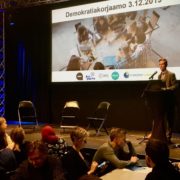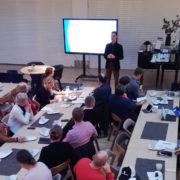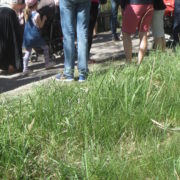COREvents #3: Civic action and collaborative governance
What leads young people to engage in collective initiatives in times of more or less severe crises? How do the motivations and forms of engagement of Millenials differ from those of previous generations? What does the changing of the civil society mean for collaborative governance?
The third COREvent will explore civic action and collaborative governance in the context of environmental and other social movements. The keynote lecture will be given by Donatella Della Porta, professor and social movement expert from the Institute for Humanities and the Social Sciences and the Center on Social Movement Studies at the Scuola Normale Superiore in Florence. Welcome!
Date: 24 May, 2019, 10:00-12:00
Place: University of Jyväskylä, Mattilanniemi 2, Jyväskylä, Agora building, hall Agora Alfa
Programme
10:00 Welcome! Tapio Litmanen, University of Jyväskylä
10:05 Donatella della Porta: Deconstructing generations in movements: evidences from anti-austerity protests in Europe (see introduction below)
Discussion
11:30 Maija Faehnle, Finnish Environment Institute SYKE and Tampere University: Civic action in the digital era – opportunities and challenges for collaborative governance
11:40 Discussion
12:00 End of the event
The event can also be followed online at: https://m3.jyu.fi/jyumv/ohjelmat/hum/yfi/prof-donatella-della-porta/live
No registration is needed. If you are on Facebook, you can pick the event to your Facebook calendar.
During the event you can post comments and questions for the lecturers in Twitter with hashtag #corestn.
Donatella della Porta’s lecture “Deconstructing generations in movements: evidences from anti-austerity protests in Europe” addresses the self-understanding of young activists in anti-austerity protests in European countries. Building on a theoretical framework that aims at bridging youth studies and social movement studies, it first introduces some main research questions such as: What leads a significant number of young people in times of more or less severe crisis to engage in collective initiatives, rather than to remain passive? What are the forms of social commitment that critical young people choose to use, in particular during periods of crisis? Which meanings are attached to these forms of social engagement? What kinds of resources are available to young people for social mobilization? And to what extent do they vary across different degrees of socioeconomic crisis, governmental constellation, and type of conflict, thereby shaping individual-level forms and levels of social participation? To what extent do differences in the impact of the crisis on national contexts, and related political transformations, result in differences in young people’s social engagement in terms of motivations and forms?
After presenting the theoretical model and the research design, the lecture summarizes some results across three main aspects: the meaning of generations in social movements, the self-definition of Millennials, as well as some characteristics of their mobilizations in terms of organizational structures, repertories of action, and collective framing. Using the concept of generations in a critical way, the lecture will deconstruct it by looking at the meaning given to generations by movement activists, to their self-perception in terms of generational identification, as well as their taste in terms of contentious frames and practices. Read more here.
Donatella Della Porta is professor of political science, dean of the Department of Political and Social Sciences and director of the PhD program in Political Science and Sociology at the Scuola Normale Superiore in Florence, where she also leads the Center on Social Movement Studies (Cosmos).
Among the main topics of her research are social movements, political violence, terrorism, corruption, the police and protest policing. She has directed a major ERC project, Mobilizing for Democracy, on civil society participation in democratization processes in Europe, the Middle East, Asia and Latin America. In 2011, she was the recipient of the Mattei Dogan Prize for distinguished achievements in the field of political sociology. She is Honorary Doctor of the universities of Lausanne, Bucharest and Goteborg.
She is the author or editor of 90 books, 135 journal articles and 135 contributions in edited volumes. Among her recent publications are: Legacies and Memories in Movements (Oxford University Press, 2018); Sessantotto. Passato e presente dell’anno ribelle (Fertrinelli, 2018); Contentious moves (Palgrave 2017), Global Diffusion of Protest (Amsterdam University Press, 2017), Late Neoliberalism and its Discontents (Palgrave, 2017); Movement Parties in Times of Austerity (Polity 2017), Where did the Revolution go? (Cambridge University Press, 2016); Social Movements in Times of Austerity (Polity 2015).
Donatella della Porta will be conferred as the University of Jyväskylä’s Honorary Doctor in the conferment of degrees ceremony on 25th of May 2019.
Maija Faehnle is a senior researcher at the Finnish Environment Institute SYKE. She is the communication manager of the CORE project and studies aspects of civil society, activism and collaboration especially in urban contexts.
Tapio Litmanen is professor on sociology at the University of Jyväskylä. He leads the work on civil society in the CORE project.
See COREvents #1 and #2 on video here.












Kommentoi
Haluatko liittyä keskusteluun?Ole hyvä ja osallistu!